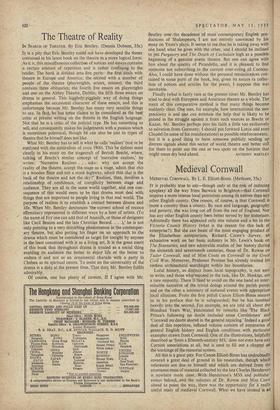The Theatre of Reality
IN SEARCH OF THEATER. By Eric Bentley. (Dennis Dobson, 35s.) IT is a pity that Eric Bentley could not have developed the theses contained in his latest book on the theatre in a more logical form. As it is, this miscellaneous collection of notices and essays contains a certain amount of repetition and is rather confusing to the reader. The book is divided into five parts : the first deals with theatre in Europe and America; the second with a number of people of the theatre (playwrights, actors, mimes);• the third contains three obituaries; the fourth five essays on playwrights and one on the Abbey Theatre, Dublin; the fifth three essays on drama in general. This higgledy-piggledy way of doing things emphasises the occasional character of these essays, and this is unfortunate because Mr. Bentley has many very sensible things to say. In fact, he has some claims to be considered as the best critic at present writing on the theatre in the English language. Not that he is a critic of the judicial type. He has something to sell, and consequently makes his judgements with a passion which is sometimes polemical, though he can also be just to types of theatre that he himself does not like.
What Mr. Bentley has to sell is what he calls 'realism' (not to be confused with the naturalism of circa 1900). This he defines most clearly in his essay on the stagecraft of Bertolt Brecht, where, talking of Brecht's similar concept of 'narrative realism,' he writes : 'Narrative Realism . . . asks : why not accept the reality of the theatre, accept the• stage as a stage, admit that this is a wooden floor and not a stone highway, admit that that is the back of the theatre and not the sky?' Realism, then, involves a relationship of confidence, of complicity between stage and audience. They are all in the same world together, and one con- sequence of this would seem to be tbat drama must deal with things that are important to people living in that real world. The purpose of realism is to establish a contact between drama and life. When Mr. Bentley denounces 'the current school of rococo effeminacy represented in different ways by .a host of artists. (To the name of Fry one can add that of Anouilh, or those of designers like Cecil Beaton and the late Christian Berard. . . .),' he is not only pointing to a very disturbing phenomenon in the contempor- ary theatre, but also putting his finger on an approach to the drama which must be considered as target for tonight by anyone in the least concerned with it as a living art. It is the great merit of this book that throughout drama is treated as a social thing enabling its audience the better to enjoy life or the better to endure it and not as an ornamental charade with a party in Chelsea as its spiritual centre. To insist on the universality of the drama is a duty at the present time. That duty Mr. Bentley fulfils admirably.
Of course, one has plenty of caveats. If I agree with Mr.
Bentley over, the decadence of most contemporary English pro- ductions of Shakespeare., I am not entirely convinced by his essay on Yeats's plays. It seems to me that he is taking away with one hand what he gives with the other, and I should be inclined to put Purgatory and The Death of Cuchulain high as a possible beginning of a genuine poetic theatre. But one can agree with him about the quality of Pirandello, and it is pleasant to find someone not subscribing to the current over-rating of Cocteau. Also, I could have done without the personal reminiscences con- tained in some parts of the book, but, given its nature (a collec- tion of notices and articles for the press), I suppose this was inevitable.
Finally (what is fairly rare at the present time) Mr. Bentley has tried to deal with European and American theatre as a whole. The merit of this comparative method is that many things become suddenly clear. One sees, for example, how international the new preciosity is and one can estimate the help that is likely to be gained in the struggle against it from such sources as Brecht or Kazan. Mr. Bentley perhaps pins his faith a little too exclusively to salvation from Germany; I should put forward Lorca and even Claudel (in some of his manifestations) as possible reinforcements; but it is a good thing to have someone publicly sending up distress signals about this sector of world theatre and better still for them to point out the one or two spots on the horizon that might mean dry land ahead. ANTHONY HARTLEY


































 Previous page
Previous page